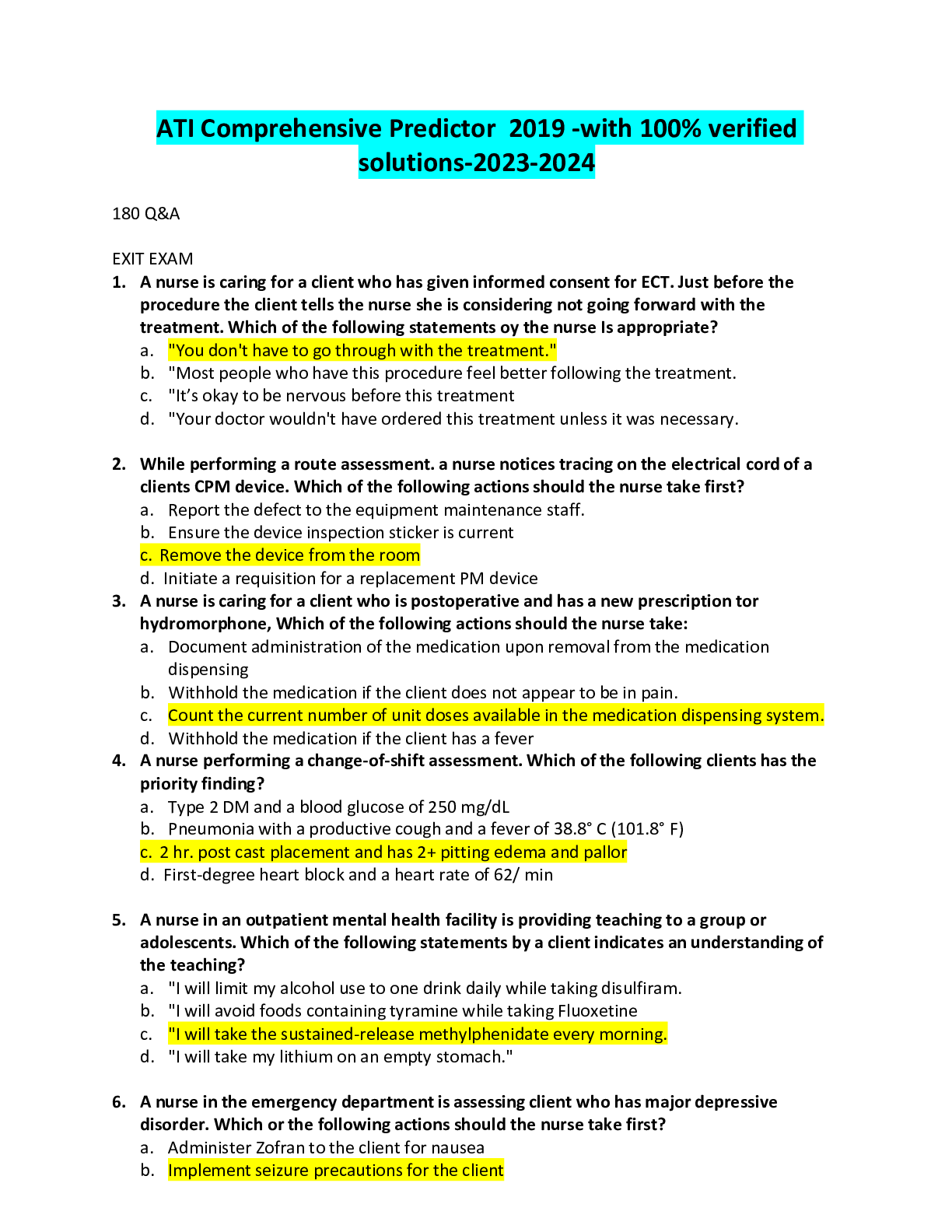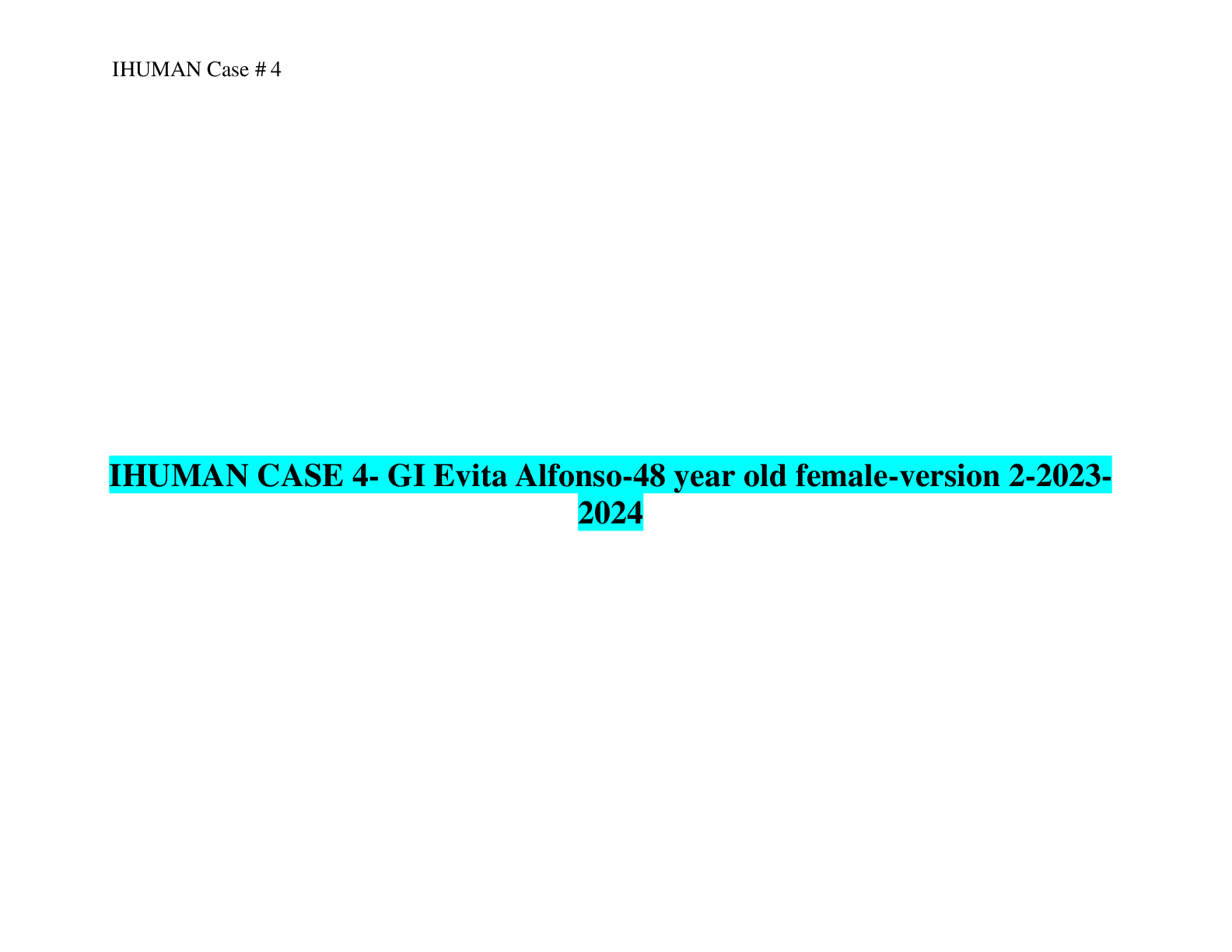NURS 6630-Psychopharmacology Midterm Exam-2021
Document Content and Description Below
• Question 1 What is the strongest established risk factor for bipolar disorder? Family History Response Feedback: “The strongest established risk factor for BPD is a family history of BPD.... ” • Question 2 Which of the following medications are known as selective serotonin re-uptake inhibitors (SSRIs)? i. Nortriptyline ii. Citalopram iii. Duloxetine iv. Fluoxetine v. Venlafaxine • Question 3 Which disease state of a non-adherent patient is at greater risk for substance use, violence, and victimization as well as worse overall quality of life? Schizophrenia Response Feedback: “Moreover, non-adherent patients with schizophrenia are at greater risk for substance use, violence, and victimization as well as worse overall quality of life.” • Question 4 Patient is a 72-year-old male with a past medical history significant for atrial fibrillation and COPD with a new diagnosis of major depression disorder. Based on his comorbid conditions, what antidepressant would you recommend as first-line? Atomoxetine Response Feedback: (Options C & D are both TCA antidepressants and, based on the patient’s age and comorbid conditions, a TCA would likely result in more side effects, such as increased fall risk due to potential for orthostatic hypotension and anticholinergic-related side effects. In addition, patient has a history for cardiac abnormalities due to A. fib diagnosis - TCAs result in electrocardiographic changes in susceptible individuals, therefore, would likely avoid. Choice B is used more for ADHD purposes than as an antidepressant) Page numbers used: Page 39 for TCA side-effect profile • Question 5 Which of the following is an appropriate strategy for managing treatment-resistant depression? Use both SSRI and SNRI • Question 6 Which of the following medications is best to AVOID in maintenance treatment of bipolar disorder and why? Response Feedback: “As noted previously, antidepressants may contribute to an increase in mood episode frequency.” • Question 7 With second-generation antipsychotics, what is the main side effect that requires frequent monitoring? Response Feedback: table 7-6 & page 80, table 7-7; Page 78: “However, attention over the past decade has focused on effect of second-generation antipsychotics on glucose metabolism and lipids and associated metabolic syndrome.” • Question 8 Which amino acid is involved in the synthesis of both norepinephrine and dopamine? • Question 9 An 81-year-old male comes to your clinic today complaining of dry mouth, blurred vision, and constipation. He has a past medical history significant for hypertension, heart failure, and depression. Of the following medications, which one is likely contributing to these side effects? CONTINUED.......... [Show More]
Last updated: 2 years ago
Preview 1 out of 24 pages

Buy this document to get the full access instantly
Instant Download Access after purchase
Buy NowInstant download
We Accept:

Also available in bundle (1)

NURS 6630 mid term and final exams
NURS 6630 mid term and final exams-different versions from 2019 to 2021
By Studyrepository 3 years ago
$45.5
9
Reviews( 0 )
$14.00
Can't find what you want? Try our AI powered Search
Document information
Connected school, study & course
About the document
Uploaded On
Mar 29, 2022
Number of pages
24
Written in
Additional information
This document has been written for:
Uploaded
Mar 29, 2022
Downloads
0
Views
99














